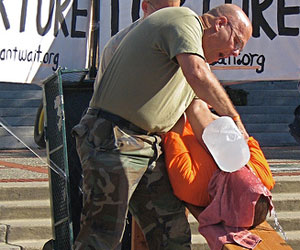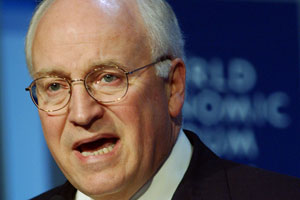A Senate judiciary subcommittee released copies of two unclassified 2005 Bush administration anti-torture memos at a hearing on Wednesday. A third anti-torture memo, written by Philip Zelikow, a former aide to then-Secretary of State Condoleezza Rice, is in the process of being declassified. Last week, Zelikow told Mother Jones that he suspected Vice President Dick Cheney was behind an effort to “collect and destroy” all copies of that memo. Zelikow also disclosed the existence of additional anti-torture memos last week, and the Senate Judiciary subcommittee, led by Sheldon Whitehouse (D-RI) was able to obtain them for Wednesday’s hearing.
The first unclassified memo, distributed in June 2005, was a joint paper [PDF] drafted by Zelikow,the state department legal adviser, John Bellinger, and Deputy Secretary of Defense Gordon England, who each harbored concerned about the White House’s treatment of terrorism suspects. In the joint paper, the torture opponents argued that “while balancing the danger these individuals may present, they must be treated humanely, consistent with our values and the values of the free world.” They also suggested that the President appoint a special board with the power to review detainee treatment and make recommendations. In the interim, Zelikow and the others suggested the US adopt the provisions of Common Article 3 of the Geneva Conventions as a basis for detainee treatment. They emphasize (in ALL CAPS):
WE ARE NOT SAYING THAT THESE DETAINEES ARE NECESSARlLY ENTITLED TO THIS STATUS. TO BE CLEAR: WE ARE GIVING THEM A TEMPORARY STATUS THEY DO NOT DESERVE. BUT WE ARE NOT DOING THIS FOR THEM. WE ARE DOING IT FOR US.
The dissidents also suggested the closure of the prison at Guantanamo Bay, Cuba and the transfer of detainees to US facilities (a position congressional Republicans now strenuously oppose):
As part of this interim system, and as the number of detainees goes down, the U.S. will no longer need to maintain a detention facility in Guantanamo. That facility will close and we expect to transfer remaining detainees to a facility in the United States.
They call for transparency:
If the U.S. acts as if it has something to hide, Americans and the world will assume it does. A durable system for handling captured terrorist suspects will be conducted in a manner that can withstand outside scrutiny. Further, the mystery can be dispelled in a way that builds understanding for the system, and for the dilemmas each country must face if it joins in fighting these violent, transnational organizations.
And they offer a prophetic warning:
As these individuals are brought to trial, aspects of their detention and interrogation will come to light. This is a fact. It must be faced. Better to face it now, and by this administration.
The Bush administration disregarded their advice. Donald Rumsfeld, then the Secretary of Defense, disavowed the joint paper and stripped England of responsibility for detainee affairs. But the very next month, Zelikow and Bellinger produced another memo [PDF]. This time, they argued more vehemently for a “stronger legal framework” for detainee treatment:
We do not adopt legal standards in our behavior as a favor to terrorists. We do it for ourselves, and to be able to exemplify the values that distinguish us from the terrorists.
Zelikow and Bellinger also pointed to specific weaknesses in the the Bush administration’s legal arguments concerning detainees. They cited the lack of a “clear and consistent standard” of treatment, the absence of a definition of “humane treatment,” and the fact that US standards of treatment were “below or inconsistent with those used by key coalition partners,” as especially troubling problems. Zelikow and Bellinger argued that the Bush administration should scrap its existing legal framework and “align the U.S.—as a matter of policy—with existing principles in the customary international law of war.” Finally, in an attempt to address concerns about how the restrictions of the Geneva Conventions might affect the intelligence-gathering process, they wrote:
These are difficult issues. In considering them we recalled how the Supreme Court of Israel (unanimously) wrestled with such questions, dealing in 1999 with the legality of certain interrogation practices used by the Shin Bet.
“Deciding these applications weighed heavy on this Court. True, from the legal perspective, the road before us is smooth. We are, however, part of Israeli society. Its problems are known to us and we live its history. We are not isolated in an ivory tower. We live the life of this country.” But they agreed with an earlier Commission that had “rejected an approach suggesting that the actions of security services in the context of fighting terrorism, shall take place in the recesses of the law.”
Instead that Commission, and the Israeli Supreme Court chose what it called “the way of Truth and the Rule of Law.” The Court observed: “Although a democracy must often fight with one hand tied behind its back, it nonetheless has the upper hand.”
That’s pretty surprising stuff to be coming from Bush administration officials way back in 2005. It’s too bad the White House didn’t really listen. While the Bush administration eventually claimed to have adopted Common Article 3 as the standard for treatment of detainees worldwide, it didn’t actually change its legal framework. Instead, Bush administration lawyers who had fought against applying the Geneva Conventions’ “cruel, inhumane, and degrading” standard to detainees simply decided that what the administration was already doing was neither cruel, nor inhumane, nor degrading.
The lawyers’ reinterpretation of Common Article 3 seemed to go unopposed until February 2006, when Zelikow distributed his still-classified memo disputing the lawyers’ legal reasoning. The unclassified memos, released featured some pretty strong arguments against the Bush administration’s policies and legal reasoning. It will be interesting to see just how harsh (or not) the classified memo turns out to be.












